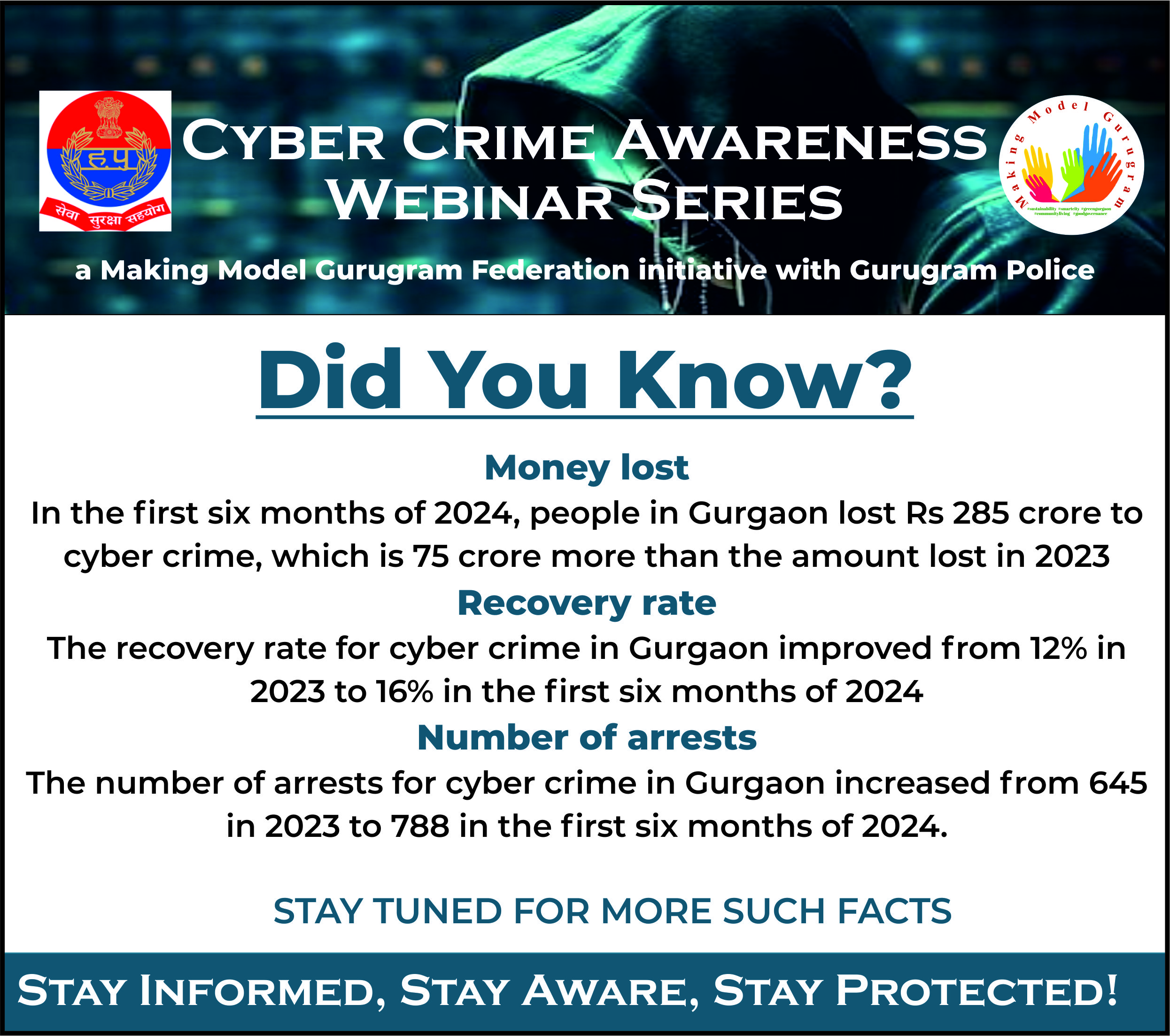Any one can be a Victim.
In today’s digital age, cyber crimes are becoming
increasingly sophisticated, targeting unsuspecting individuals and businesses alike. From phone scams to fake KYC requests, these crimes can have serious financial and emotional consequences. Understanding these threats and knowing how to respond can help protect you and your family in the online world. Here’s a guide to some of the most common types of cyber crimes and practical tips to safeguard yourself.
Join Today
https://us06web.zoom.us/meeting/register/tZElcOGrqzovE9NMNBwFe_mk9ASBsdH5nSiJ

1. Common Types of Cyber Crimes
Cyber crimes take many forms, but some scams are especially prevalent. Here are a few that may sound familiar, along with quick tips on how to avoid falling for them:
a. Phone Scams Impersonating Authorities
- Example: You receive a call claiming to be from the Telecom Regulatory Authority of India (TRAI) about your number being discontinued. The caller might ask for personal information to “resolve” the issue.
- Reality Check: Regulatory authorities don’t call individuals directly to solve technical issues. This is often a tactic to steal your information.
- How to Protect Yourself: If you receive such a call, don’t provide any information. Hang up, and if concerned, contact your service provider directly.
b. Parcel Scams Claiming Your Package is Stuck at Customs
- Example: Scammers may call or email you claiming that a parcel is stuck at customs and requires additional payment or verification.
- Reality Check: Customs does not personally reach out to individuals about detained parcels in this manner.
- How to Protect Yourself: Verify directly with the courier service. Don’t click on any links or share details with unverified contacts.
c. Fake Digital Arrests and Impersonation
- Example: A call or email claims you are under “digital arrest” or that a family member is in trouble and only a payment will resolve it.
- Reality Check: Law enforcement will not demand immediate payment over the phone or online.
- How to Protect Yourself: Verify independently by contacting your family member or local authorities. Avoid engaging with any suspicious messages.
d. Get-Rich-Quick Scams
- Example: Promises of fast earnings through “investment opportunities” or “easy tasks for high rewards.”
- Reality Check: Legitimate financial returns require sound investment, time, and effort.
- How to Protect Yourself: Be wary of schemes that promise quick money, especially if they ask for an upfront investment.
e. Mistaken Money Transfer Scams
- Example: Scammers claim to have accidentally transferred money to your account and ask for a return or verification.
- Reality Check: Genuine bank errors are corrected by banks directly, not by individual contacts.
- How to Protect Yourself: If you receive an unexpected deposit or a request, contact your bank directly for clarification.
f. Expired KYC Requests
How to Protect Yourself: Avoid clicking on links in unsolicited messages. Visit your bank’s website directly or contact their customer service.
Example: You receive a text or email prompting you to update your KYC details through a link.
Reality Check: Banks usually ask you to update KYC in person or through secure apps, not via random links.
2. Practical Steps to Protect Yourself from Cyber Crime
Understanding how to protect yourself from these scams can prevent financial loss, emotional distress, and identity theft. Here are some practical steps to keep in mind:
a. Secure Your Personal Information
- Avoid sharing sensitive details (like your ID number, bank account, or OTPs) over calls, emails, or texts, even if they seem legitimate.
- When setting up online accounts, use strong passwords and change them regularly.
b. Verify Before You Trust
- When in doubt, verify! If you receive a suspicious message or call, contact the organization directly using their official contact information, not through the link or number provided in the message.
- For parcels or financial matters, reach out directly to your bank, courier, or relevant authority.
c. Be Wary of Suspicious Links and Attachments
- Cyber criminals often use links or attachments as traps to steal information or install malware. Avoid clicking on links or opening attachments from unknown senders.
- Hover over links to check their destination before clicking, especially if they claim to be from financial or official institutions.
d. Keep Software Updated
- Ensure that your device’s operating system, apps, and antivirus software are up-to-date. Many updates include security patches that protect against the latest threats.
- Enable automatic updates where possible to minimize the risk of missing critical security patches.
e. Use Two-Factor Authentication (2FA)
- Enable 2FA on important accounts (like email, banking, and social media). This adds an additional layer of security, even if someone gains access to your password.
- Opt for app-based authentication rather than SMS for added security.
f. Know Where to Report Cyber Crimes
In India, cyber crime incidents can be reported via the national helpline at 1930 or through the government’s official website, www.cybercrime.gov.in. Knowing where to report incidents can help law enforcement respond quickly and prevent others from falling victim.
3. Cyber Crime is Real—Be Prepared
Cyber crime is an unfortunate reality of the digital age, but you can take steps to protect yourself and your loved ones. By being cautious, verifying suspicious communications, and securing your devices, you can reduce your risk of becoming a victim.
Staying informed is key. Share this knowledge with family members, especially those less familiar with digital scams, like seniors or young adults. Remember: if something feels off, it probably is. Trust your instincts, protect your information, and don’t hesitate to seek help if needed.
As cyber criminals continue to devise new tactics, awareness and vigilance are our best defenses. Empower yourself with knowledge, practice safe online habits, and stay connected with trusted resources. Cyber safety is everyone’s responsibility, and together we can make the internet a safer space for all.
Join Us in Taking Action Against Cyber Crime
To further empower residents and build a safer digital community, Making Model Gurgaon (MMG), in collaboration with the Cyber Crime Unit of Gurgaon Police, is hosting a Cyber Crime Awareness Webinar on 24th November 2024. This event will feature expert insights from the Police Commissioner, Assistant Police Commissioner (Cyber Crime), and MMG Leader Gauri Sarin, covering the latest trends in cyber crime, practical safety tips, and the launch of the Cyber Marshals Program.
Be part of this initiative to learn how to protect yourself, your family, and your community from online threats. Register now by clicking on the link below:
https://us06web.zoom.us/meeting/register/tZElcOGrqzovE9NMNBwFe_mk9ASBsdH5nSiJ
Together, we can make Gurugram a model city for cyber safety and awareness. Don’t miss this opportunity to take a stand against cyber crime!
